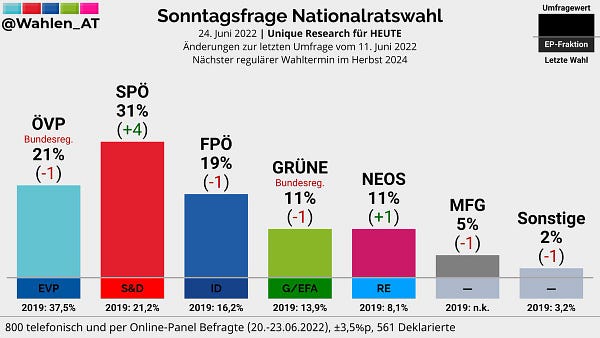Another Future Is Possible
With the conservative ÖVP crashing in the polls, the talk of the town in Vienna is a possible traffic light left-liberal coalition

Servus!
The Sommerpause, the summer break, is fast approaching, and with it, the season of idle political speculation. As I covered in the edition of the newsletter that went out two weeks ago, faced with spiraling inflation and corruption scandals, the People’s Party (ÖVP)’s popularity is cratering. Polls taken in recent days have shown the opposition Social Democratic Party (SPÖ) as far as ten points ahead of their conservative rivals: a development the SPÖ could not have believed was possible when in parliamentary elections held in 2019, the party fell to its worst ever result (21.2 percent) as the ÖVP ran away with the contest (37.5 percent).


The SPÖ’s rise and ÖVP’s decline has led some on the left to believe another future is possible. While SPÖ leader Pamela Rendi-Wagner and the all-powerful Vienna state branch of the SPÖ—whose kingmakers include Vienna mayor Michael Ludwig and deputy president of the Austrian parliament Doris Bures—are said to favor a consensus coalition with the ÖVP, Burgenland governor and permanent thorn in Rendi-Wagner’s side Hans Peter Doskozil used an interview published over the weekend to argue for a so-called traffic light coalition: a three-way government involving the SPÖ, Greens, and liberal NEOS.
While an equivalent government currently sits in Berlin, such a formulation has never been tested in Vienna. Doskozil’s case was that, if the SPÖ were to govern again after several years in the political wilderness, it has to have the courage of its convictions. Only in a traffic light coalition could the SPÖ effectively push for, among other things, a higher minimum wage for state employees and more support for family members who act as care workers for their relatives. Certainly, Doskozil is trying to position himself here as an alternate pole to Rendi-Wagner in the party, but he is far from alone in the SPÖ in his opposition to another compromise coalition with the ÖVP.
A grand coalition would be a more secure partnership with stronger institutional support including from the trade union movement. But the numbers are also just about there for a traffic light coalition, with the SPÖ, Greens, and NEOS collectively polling over 50 percent in recent surveys. Yet the question is not only whether the SPÖ would desire it but the Greens and NEOS too. The Greens are able to hold aloft certain trophies from their time in government with the ÖVP over the past couple of years: a tax on carbon emissions, investments in and subsidies for public transport, a halt to plans to build a road tunnel under the Danube-Auen National Park, and so on.


But the Greens have also had to compromise themselves in many ways, including signing lock, stock and barrel onto the ÖVP’s conservative and in some ways populist socio-economic agenda. The more ideological wing of the party would surely find a coalition with the SPÖ more comfortable. As for the NEOS, the liberal party is now 10 years old and its leading lights are said to feel the time has come to take up the mantle of power. A report in this weekend’s Standard notes that party leader Beate Meinl-Reisinger would prefer an SPÖ-led coalition to an ÖVP- one. The party’s economic spokesperson Gerald Loacker told the paper, however, that without a commitment to substantive things like pension reform, the NEOS’ participation in government would be pointless.
A liberal-left coalition in Austria that sidelined the ÖVP—which has been in government since 1986—would be a game-changer, but one should never underestimate the left’s capacity to undermine itself. Rumor has it that former SPÖ chancellor Christian Kern is making moves to found a new political movement: a centrist one modeled on Emmanuel Macron’s En Marche! The idea is that a new party would strengthen the left-center bloc in parliament, though in effect it may only divide it further, which would be a gift to the right in the end. Kern had dinner the other night with ÖVP bigwigs who had been pushed aside during the Sebastian Kurz years. Something could be afoot. Or nothing. Such is the season of idle political speculation.
Bis bald!
Thank you for subscribing to the Vienna Briefing. If you know someone who might be interested in reading this newsletter, consider sharing it with them today.
The Vienna Briefing is a free newsletter. If you would like to support my work, you can send me a tip via PayPal.
Vaccine Man-Don’t
The Austrian government has abandoned plans to implement its vaccine mandate. The Omicron variant has rendered mandatory vaccination pointless, health minister Johannes Rauch said last week, adding the time had come to heal the divisions the mandate opened up in Austrian society.
Deep Fake
Vienna mayor Michael Ludwig was fooled last Wednesday by a man claiming to be Kyiv mayor Vitali Klitschko. According to the German newspaper Bild, the deepfake emailed Ludwig's office from the address mayor.kyiv@ukr.net, although official Ukrainian government email addresses end in gov.ua. Ludwig claimed his office suffered a security breach.
Nazis On WhatsApp
Police have charged 35 teenagers in the state of Upper Austria suspected of violating the country’s Prohibition Law against National Socialist activity, sharing child pornography, and committing hate crimes. The gang shared Nazi messages via WhatsApp, some of which were filmed at the concentration camp Mauthausen.


